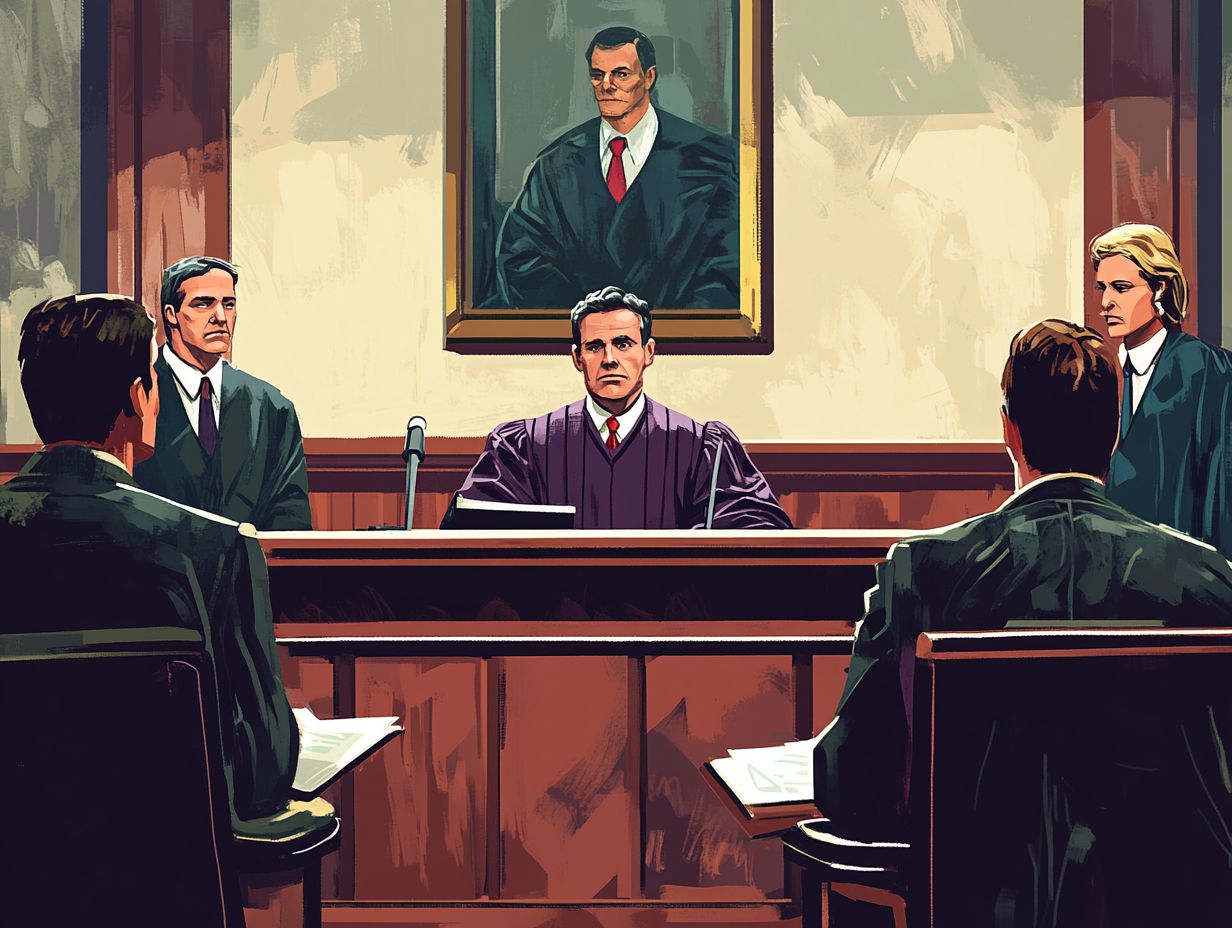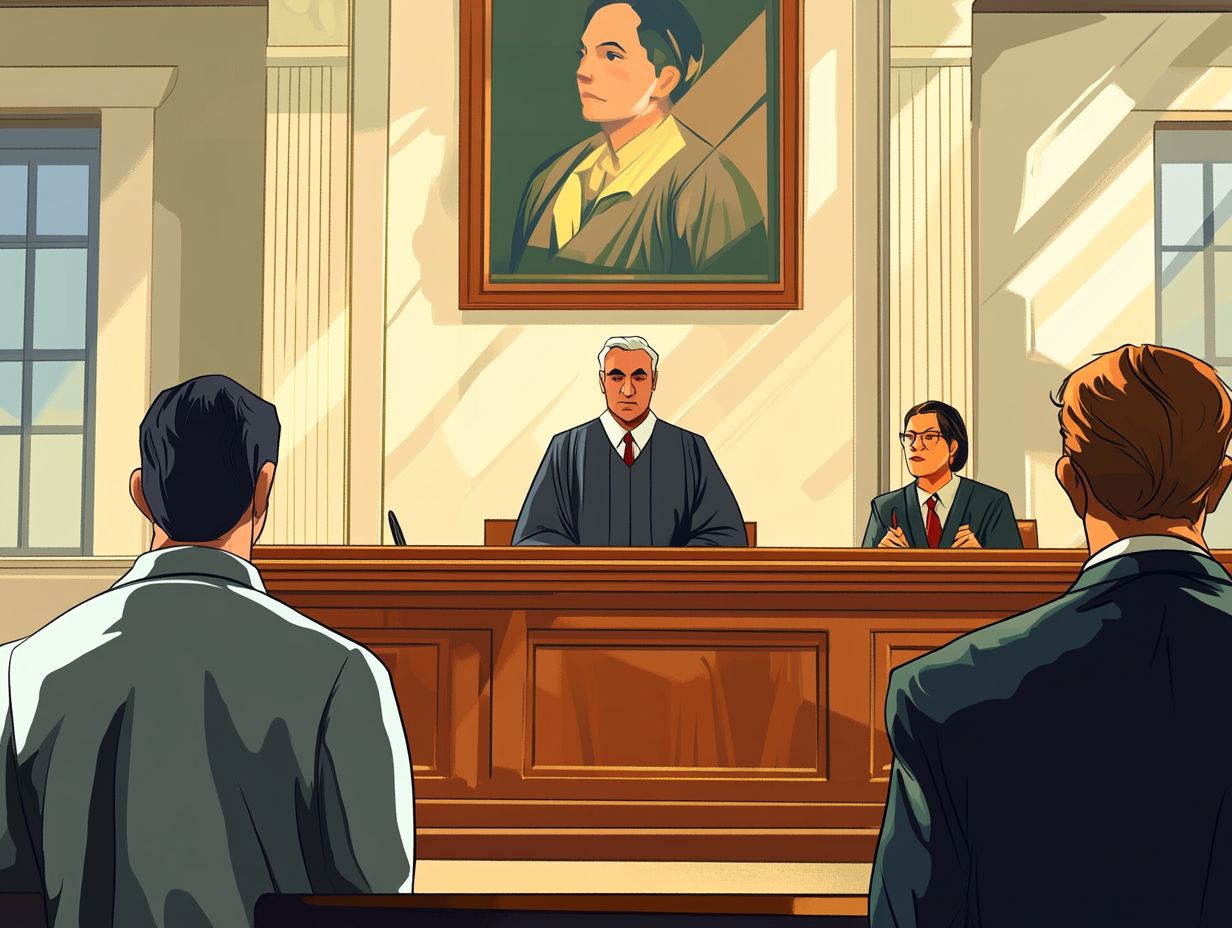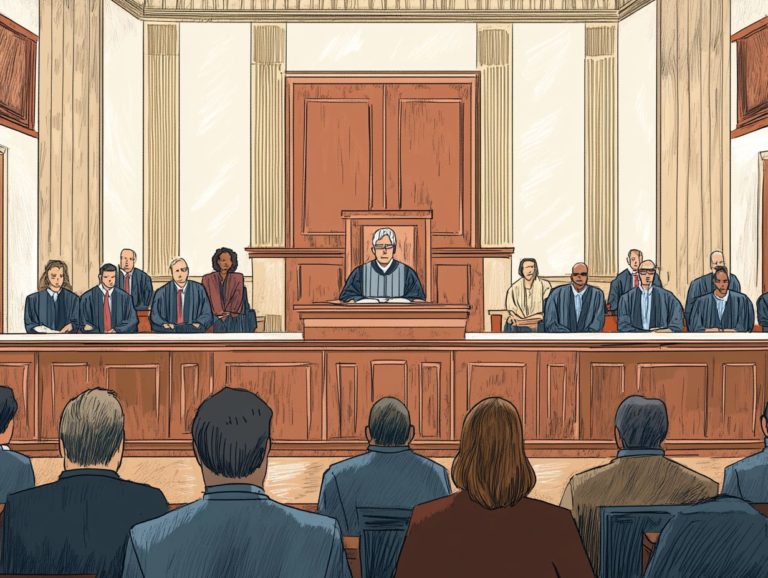What Happens During Arraignment?
Arraignment is a pivotal moment in the criminal justice process. It marks your first formal interaction with the court.
This overview details what unfolds during arraignment, including its definition, purpose, and a step-by-step breakdown of the process. You ll also learn about your rights as the accused.
We ll delve into the potential outcomes of the arraignment, offer tips for preparation, and address common questions to help you navigate this significant legal milestone.
Whether you re facing arraignment or simply looking to gain a deeper understanding of the process, this guide equips you with essential insights!
Contents
Key Takeaways:

During arraignment, the defendant is officially charged and enters a plea (guilty, not guilty, or no contest) to the accusation.
The defendant has certain legal rights, such as the right to an attorney and the right to remain silent.
You must be prepared for arraignment! Understanding the process can make all the difference.
Overview of Arraignment
The arraignment represents a pivotal moment in the criminal justice system. You formally appear in court to hear the charges brought against you.
This is your chance to respond to these allegations by entering a plea of guilty, not guilty, or no contest. This initial appearance is not just procedural; it s an opportunity for you to grasp the legal landscape you re navigating and to ensure that your rights are safeguarded throughout the process ahead.
Definition and Purpose
The term “arraignment” refers to the formal reading of charges against you in a court of law. It is designed to inform you of the legal accusations you face.
This step is crucial! It protects your rights and helps you understand what s at stake.
By allowing you to hear the specifics of your case, the arraignment promotes transparency and clarifies the legal proceedings that lie ahead. This stage also provides you with the opportunity to enter a plea, which can significantly influence the trajectory of your case.
Ultimately, the structured framework of the arraignment ensures that you are aware of your situation and lays the groundwork for the judicial process that follows, reinforcing the fundamental principle of fair treatment under the law.
The Arraignment Process
The arraignment process entails a series of procedural steps designed to protect your rights as a defendant. It begins with the notification of your arraignment and culminates in your court appearance, where the charges against you are formally presented.
Each step is crucial in ensuring that your rights are respected throughout the legal proceedings.
Step-by-Step Explanation
A comprehensive understanding of the arraignment process reveals several key steps. This begins with your initial appearance before the court and involves setting court dates and making decisions about bail and other preliminary matters.
This journey starts when you are formally presented before the court after an arrest. You will be informed of the charges against you. During this critical hearing, the judge reviews the particulars of your case to outline the necessary next steps, often setting a timeline for future court dates.
The judge’s judgment is paramount at this stage. The judge will consider factors such as the severity of the charges, your criminal history, and your ties to the community. These can significantly impact decisions regarding bail and preliminary issues.
The arraignment is a pivotal moment! It determines your immediate status and lays the groundwork for what lies ahead in the judicial process.
Rights of the Accused During Arraignment

The rights of the accused during arraignment are paramount. They provide essential legal protections that guarantee a fair and just legal process.
This underscores the importance of securing competent legal representation and fully understanding one s legal standing.
Legal Protections and Procedures
Legal protections during arraignment uphold your rights. They ensure you get effective help from your attorney when you appear in court.
These safeguards are vital. They not only preserve the integrity of the judicial process but also lay the groundwork for a fair trial.
For example, you ll be informed of the charges against you. This enables your attorney to prepare a clear defense strategy.
Having an attorney by your side is essential. They help you fully understand your rights, including your right to remain silent and your right to plead not guilty.
Your attorney actively monitors the proceedings. This ensures that all procedural rules are followed, safeguarding you against any potential abuses of power within the legal system.
Possible Outcomes of Arraignment
During arraignment, you have several possible outcomes to consider:
- You can enter a guilty plea.
- You can enter a not guilty plea.
- You can enter a plea of no contest.
Each option carries its own set of legal implications. It will significantly influence the course of the criminal charges you face.
Guilty, Not Guilty, or No Contest Pleas
During your arraignment, you ll have the opportunity to enter a guilty plea, a not guilty plea, or a no contest plea. Each choice carries distinct legal ramifications and shapes the trajectory of your case.
A guilty plea signifies your acceptance of responsibility for the crime. It can streamline the legal process but may restrict your appeal options later.
A not guilty plea asserts your claim of innocence. This paves the way for potential trial proceedings and opens doors to plea negotiations with the prosecution.
Choosing a no contest plea allows you to avoid admitting guilt while still accepting the penalties tied to the charge. This can often be a strategic move to evade civil liability.
Grasping these nuances is essential. Each choice affects your rights and informs your overall defense strategy.
Preparing for Arraignment
Preparing for arraignment means understanding the charges against you. Collaborate effectively with your legal representation and equip yourself with knowledge about what to expect during your court appearance.
This preparation is crucial for navigating the process and working towards a favorable outcome.
What to Expect and How to Prepare

When preparing for arraignment, it s crucial for defendants to know what awaits them in the courtroom. Be aware of the intricacies of the arraignment process, your specific role, and the importance of having legal counsel to navigate the complexities of your case.
In this initial hearing, you will stand before a judge in a formal yet often charged environment. The weight of the situation is palpable.
As you enter the courtroom, you ll likely observe other defendants, legal professionals, and perhaps even family members, all contributing to the atmosphere.
The arraignment typically unfolds through several procedural steps, beginning with the reading of the charges, followed by your plea. At this pivotal moment, having legal counsel isn t just a suggestion; it s essential.
Experienced attorneys can offer invaluable guidance. They can discuss potential consequences and help you strategize your next steps in the legal process, ensuring you are thoroughly prepared for what lies ahead.
Common Questions About Arraignment
What should I expect during my arraignment? Common questions about arraignment typically focus on the intricacies of the legal process, the rights afforded to the defendant, and the pivotal role an attorney plays in helping you navigate the complexities that arise during courtroom proceedings.
Answers to Frequently Asked Questions
Answers to frequently asked questions about arraignment clarify the legal process. This ensures you understand your rights and responsibilities in the courtroom.
This pivotal stage in the criminal justice system sets the tone for what comes next. During the arraignment, you will hear the charges against you formally and can respond with a plea of guilty, not guilty, or no contest.
You can ask about bail options and any needed legal representation. Knowing what to expect eases anxiety around courtroom procedures, enabling you to navigate your rights effectively.
Frequently Asked Questions
What Happens During Arraignment?
Arraignment is the first court appearance after being charged with a crime. You ll be informed of the charges and asked to enter a plea.
What is the purpose of an arraignment?

The purpose is to inform you of the charges and give you a chance to plead. You can say guilty, not guilty, or no contest.
Do I need a lawyer for my arraignment?
It s highly recommended to have a lawyer, though it s not required. If you can t afford one, the court will appoint a lawyer for you.
What should I expect during my arraignment?
The judge will read the charges, ask for your plea, and discuss bail conditions. Listen carefully and follow the judge s instructions.
Can I change my plea after the arraignment?
Yes, but consult a lawyer before changing your plea. They can guide you on the implications.
What happens if I plead guilty during my arraignment?
If you plead guilty, the judge may issue a sentence right away or schedule a later hearing. Understand the consequences of pleading guilty and discuss your options with a lawyer before you decide.






